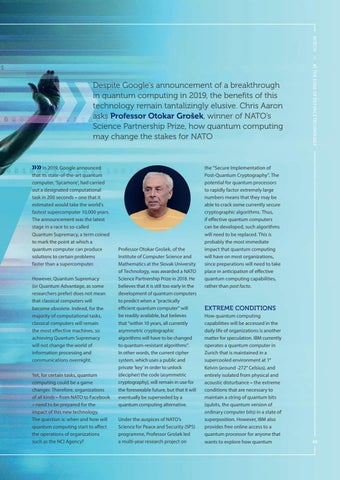In 2019, Google announced that its state-of-the-art quantum computer, ‘Sycamore’, had carried out a designated computational task in 200 seconds – one that it estimated would take the world’s fastest supercomputer 10,000 years. The announcement was the latest stage in a race to so-called Quantum Supremacy, a term coined to mark the point at which a quantum computer can produce solutions to certain problems faster than a supercomputer. However, Quantum Supremacy (or Quantum Advantage, as some researchers prefer) does not mean that classical computers will become obsolete. Indeed, for the majority of computational tasks, classical computers will remain the most effective machines, so achieving Quantum Supremacy will not change the world of information processing and communications overnight. Yet, for certain tasks, quantum computing could be a game changer. Therefore, organizations of all kinds – from NATO to Facebook – need to be prepared for the impact of this new technology. The question is: when and how will quantum computing start to affect the operations of organizations such as the NCI Agency?
Professor Otokar Grošek, of the Institute of Computer Science and Mathematics at the Slovak University of Technology, was awarded a NATO Science Partnership Prize in 2018. He believes that it is still too early in the development of quantum computers to predict when a “practically efficient quantum computer” will be readily available, but believes that “within 10 years, all currently asymmetric cryptographic algorithms will have to be changed to quantum-resistant algorithms”. In other words, the current cipher system, which uses a public and private ‘key’ in order to unlock (decipher) the code (asymmetric cryptography), will remain in use for the foreseeable future, but that it will eventually be superseded by a quantum computing alternative. Under the auspices of NATO’s Science for Peace and Security (SPS) programme, Professor Grošek led a multi-year research project on
NITECH ››› AT THE EDGE OF DEFENCE TECHNOLOGY
Despite Google’s announcement of a breakthrough in quantum computing in 2019, the benefits of this technology remain tantalizingly elusive. Chris Aaron asks Professor Otokar Grošek, winner of NATO’s Science Partnership Prize, how quantum computing may change the stakes for NATO
the “Secure Implementation of Post-Quantum Cryptography”. The potential for quantum processors to rapidly factor extremely large numbers means that they may be able to crack some currently secure cryptographic algorithms. Thus, if effective quantum computers can be developed, such algorithms will need to be replaced. This is probably the most immediate impact that quantum computing will have on most organizations, since preparations will need to take place in anticipation of effective quantum computing capabilities, rather than post facto.
EXTREME CONDITIONS How quantum computing capabilities will be accessed in the daily life of organizations is another matter for speculation. IBM currently operates a quantum computer in Zurich that is maintained in a supercooled environment at 1° Kelvin (around -272° Celsius), and entirely isolated from physical and acoustic disturbance – the extreme conditions that are necessary to maintain a string of quantum bits (qubits, the quantum version of ordinary computer bits) in a state of superposition. However, IBM also provides free online access to a quantum processor for anyone that wants to explore how quantum
49
